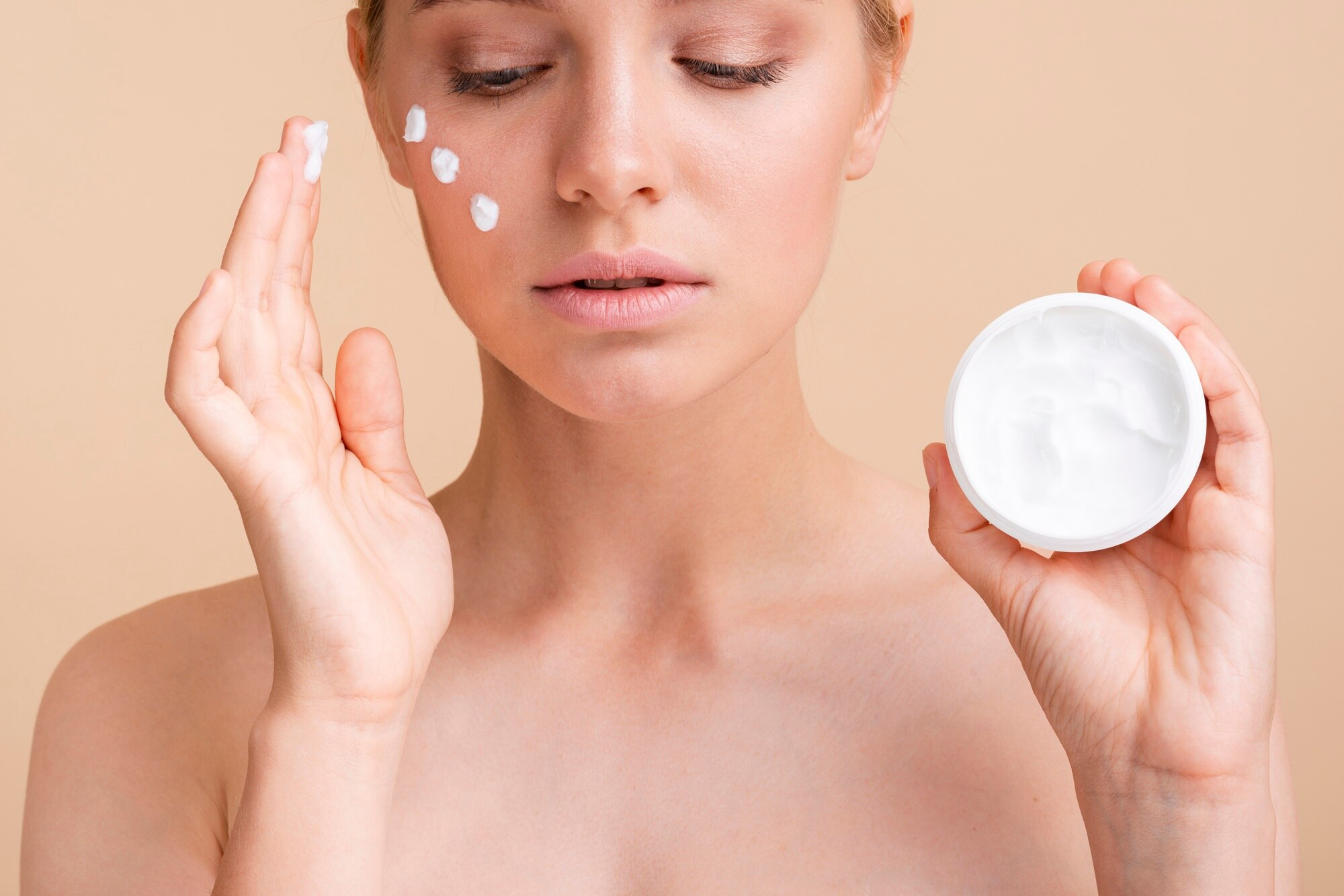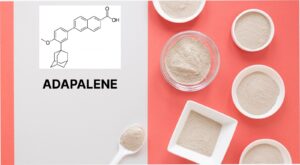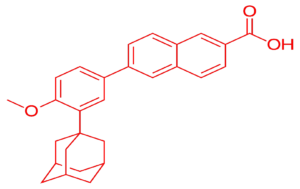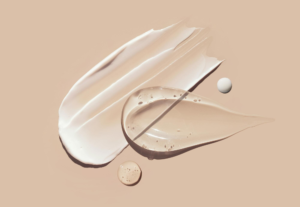
What is Retinol Cream?
Retinol cream is a skincare product that contains retinol, a derivative of vitamin A.
It is widely used to treat wrinkles, acne, hyperpigmentation, and rough skin texture. Retinol works by stimulating collagen production, promoting skin cell turnover, and unclogging pores, making it a popular ingredient in anti-aging and acne treatments.
Retinol is available in both over-the-counter (OTC) creams and prescription-strength formulas, such as tretinoin. On one hand, OTC retinol is milder and takes longer to show results. On the other hand, prescription forms are stronger and work faster, making them ideal for those with severe skin concerns.
Active Ingredients in Retinol Cream
Retinol creams often contain other active ingredients to enhance their effectiveness and reduce irritation. Here’s a breakdown of key ingredients:
1. Retinoids (Vitamin A Derivatives)
- Retinol – The most common form found in OTC creams. It converts into retinoic acid in the skin, promoting collagen production and increasing skin cell turnover.
- Retinyl Palmitate – A gentler form of retinol, suitable for sensitive skin.
- Retinaldehyde (Retinal) – Stronger than retinol but milder than prescription retinoids. also It works faster than retinol but is still gentle.
- Tretinoin (Retinoic Acid) – A prescription-strength retinoid used for severe acne and deep wrinkles.
- Adapalene – A synthetic retinoid found in acne treatments like Differin gel.
2. Hydrating and Soothing Ingredients
- Hyaluronic Acid – Helps retain moisture and prevents dryness.
- Glycerin – A humectant that keeps the skin hydrated.
- Ceramides – Strengthens the skin barrier and reduces irritation caused by retinol.
- Niacinamide (Vitamin B3) – Calms inflammation, brightens skin, and supports the skin barrier.
3. Exfoliating and Brightening Agents
- Lactic Acid & Glycolic Acid (AHAs) – Gently exfoliate dead skin cells to improve skin texture.
- Vitamin C – An antioxidant that works well with retinol to brighten skin and boost collagen production.
- Kojic Acid & Licorice Extract – Help reduce hyperpigmentation and dark spots.
4. Antioxidants
- Green Tea Extract – Protects against environmental damage and soothes skin.
- Vitamin E – Helps neutralize free radicals and provides extra hydration.
Explore a leading manufacturer of APIs.
With over 10 years of expertise, we ensure GMP compliance and provide reliable, high-quality solutions.
How Does Retinol Cream Work?
Retinol penetrates the skin and accelerates cell renewal, pushing out old skin cells and replacing them with new ones. This reduces fine lines, unclogs pores, and fades dark spots over time.
Here’s how it benefits the skin:
- Increases Collagen Production – Makes skin firmer and reduces the appearance of wrinkles.
- Boosts Skin Cell Turnover – Speeds up the natural exfoliation process, making the skin look fresh and youthful.
- Unclogs Pores – Prevents acne by keeping pores clear.
- Evens Skin Tone – Fades dark spots, sun damage, and post-acne marks.
- Improves Skin Texture – Reduces rough patches and fine lines, making the skin feel smoother.
Benefits of Using Retinol Cream
Retinol is known for its wide range of skin benefits, making it a staple in many skincare routines.
1. Anti-Aging Properties
- Reduces fine lines and wrinkles by increasing collagen production.
- Prevents premature aging caused by sun exposure and environmental damage.
2. Acne Treatment
- Clears clogged pores and reduces breakouts.
- Controls excess oil production.
- Helps fade acne scars and post-inflammatory hyperpigmentation.
3. Brightens and Evens Skin Tone
- Reduces dark spots, sun damage, and melasma.
- Enhances radiance by promoting healthy skin cell renewal.
4. Improves Skin Texture
- Smooths out rough, bumpy skin.
- Minimizes enlarged pores.
5. Prevents Future Skin Damage
- Protects skin from free radicals that cause premature aging.
- Strengthens the skin barrier, making it more resilient.
How to Use Retinol Cream for Best Results
To get the most out of retinol while also minimizing irritation, follow these important guidelines:
1. Start with a Low Strength
If you’re new to retinol, it’s best to begin with a lower concentration (0.25% or 0.5%) and gradually increase usage.
That being said, higher concentrations like 1% should only be used by those with prior experience using retinol, as they are much stronger and may cause irritation.
2. Apply at Night
Because retinol makes the skin more sensitive to sunlight, it’s crucial to apply it before bedtime.
Additionally, during the day, wear a broad-spectrum sunscreen to protect your skin from sun damage. Failing to do so can increase the risk of sunburn and skin sensitivity.
3. Use a Pea-Sized Amount
When it comes to retinol, a little goes a long way. Overusing it can actually lead to irritation and dryness.
For best results, apply only a thin layer to clean, dry skin.
4. Moisturize Well
Since retinol can be drying, it’s important to use a hydrating moisturizer right after applying it.
Look for moisturizers with hyaluronic acid, ceramides, or niacinamide, as these ingredients help soothe the skin and prevent irritation.
5. Avoid Mixing with Harsh Ingredients
To prevent irritation, do NOT use retinol with the following:
- Benzoyl Peroxide (because it can deactivate retinol)
- AHAs/BHAs (Exfoliating Acids) (since they may increase irritation)
- Vitamin C (instead, use it in the morning)
However, you can safely pair retinol with hydrating and soothing ingredients to balance its effects.
Side Effects of Retinol Cream
Although retinol offers many benefits, it’s common to experience temporary side effects, especially during the first few weeks of use.
Common Side Effects:
- Dryness and Peeling – Skin may feel flaky as it adjusts to retinol.
- Redness and Irritation – If irritation occurs, try reducing frequency.
- Increased Sun Sensitivity – Always apply sunscreen to protect your skin.
How to Reduce Irritation:
- Start slowly – Use it only 2-3 times a week before increasing frequency.
- Apply a moisturizer before or after to buffer its effects.
- Choose a lower-strength formula if you have sensitive skin.
Who Should Use Retinol Cream?
Retinol is suitable for most skin types, but it works especially well for:
- People with acne-prone skin
- Those looking for anti-aging benefits
- Individuals with uneven skin tone or dark spots
- Anyone who wants to improve skin texture
Who Should Avoid Retinol?
Even though retinol is highly effective, some people should avoid it:
- Pregnant or breastfeeding women (because retinoids can affect fetal development)
- People with extremely sensitive skin or eczema (as it may cause excessive irritation)
- Those already using strong exfoliants (since over-exfoliation can damage the skin barrier)
Final Thoughts: Is Retinol Cream Worth It?
Retinol is a powerful and effective skincare ingredient that can transform your skin when used correctly. Not only does it help with wrinkles, acne, and skin texture, but it also promotes long-term skin health.
To ensure the best results:
Start with a low concentration
Apply it at night
Use a moisturizer
Always wear sunscreens-aging, acne, dark spots, and overall skin texture. However, patience is key—results take time!
Reference:
- Zasada M, Budzisz E. Retinoids: active molecules influencing skin structure formation in cosmetic and dermatological treatments. Postepy Dermatol Alergol. 2019;36(4):392-397. doi:10.5114/ada.2019.87443
- National Institutes of Health. Vitamin A and carotenoids.
- Leyden J, Stein-Gold L, Weiss J. Why topical retinoids are mainstay of therapy for acne. Dermatol Ther (Heidelb). 2017;7(3):293-304. doi:10.1007/s13555-017-0185-2
- Sacchidanand SA, Lahiri K, Godse K, et al. Synchronizing pharmacotherapy in acne with review of clinical care. Indian J Dermatol. 2017;62(4):341-357. doi:10.4103/ijd.IJD_41_17
- Callender VD, Baldwin H, Cook-Bolden FE, Alexis AF, Stein Gold L, Guenin E. Effects of topical retinoids on acne and post-inflammatory hyperpigmentation in patients with skin of color: a clinical review and implications for practice. Am J Clin Dermatol. 2022;23(1):69-81. doi:10.1007/s40257-021-00643-2
- Zasada M, Budzisz E, Erkiert-Polguj A. A clinical anti-ageing comparative study of 0.3 and 0.5% retinol serums: a clinically controlled trial. Skin Pharmacol Physiol. 2020;33(2):102-116. doi:10.1159/000508168
- Kong R, Cui Y, Fisher GJ, et al. A comparative study of the effects of retinol and retinoic acid on histological, molecular, and clinical properties of human skin. J Cosmet Dermatol. 2016;15(1):49-57. doi:10.1111/jocd.12193
- Shao Y, He T, Fisher GJ, Voorhees JJ, Quan T. Molecular basis of retinol anti-ageing properties in naturally aged human skin in vivo. Int J Cosmet Sci. 2017;39(1):56-65. doi:10.1111/ics.12348
- Ota M, Jiang W, Ueno K, Ichimi A, Hara E, Sakurada K. 182 Retinol remarkably effective in reducing neck wrinkles. JID. 2019;139(9). doi:10.1016/j.jid.2019.07.186
- American Academy of Dermatology. Retinoid or retinol?.
- American Academy of Dermatology. Should I apply my skin care products in a certain order?.
- Bouloc A, Vergnanini AL, Issa MC. A double-blind randomized study comparing the association of Retinol and LR2412 with tretinoin 0.025% in photoaged skin. J Cosmet Dermatol. 2015;14(1):40-46. doi:10.1111/jocd.12131
- The American College of Obstetricians and Gynecologists. Skin conditions during pregnancy.
- Milosheska D, Roškar R. Use of retinoids in topical antiaging treatments: a focused review of clinical evidence for conventional and nanoformulations. Adv Ther. 2022;39(12):5351-5375. doi:10.1007/s12325-022-02319-7
FAQs
What does retinol cream do for your skin?
Retinol cream helps with anti-aging, acne, hyperpigmentation, and skin texture improvement. It stimulates collagen production, increases skin cell turnover, and unclogs pores, resulting in smoother, firmer, and clearer skin.
How often should I use retinol cream?
If you’re a beginner, start using retinol 2-3 times a week and gradually increase frequency as your skin adjusts. Once your skin tolerates it well, you can use it every night.
Can I use retinol if I have sensitive skin?
Yes, but start with a low-strength retinol (0.25% or 0.5%) and apply it only once or twice a week to minimize irritation. Using a moisturizer alongside retinol can also help reduce dryness.
Can men use retinol cream?
Yes! Retinol is beneficial for all genders. It helps reduce wrinkles, acne, and rough skin texture.
Can I apply makeup after using retinol?
Yes, but apply retinol at night and use a hydrating primer or moisturizer before makeup in the morning to avoid dryness.
Which synthetic retinoid used for acne treatments?
Adapalene. is synthetic retinoid used for acne treatments.



